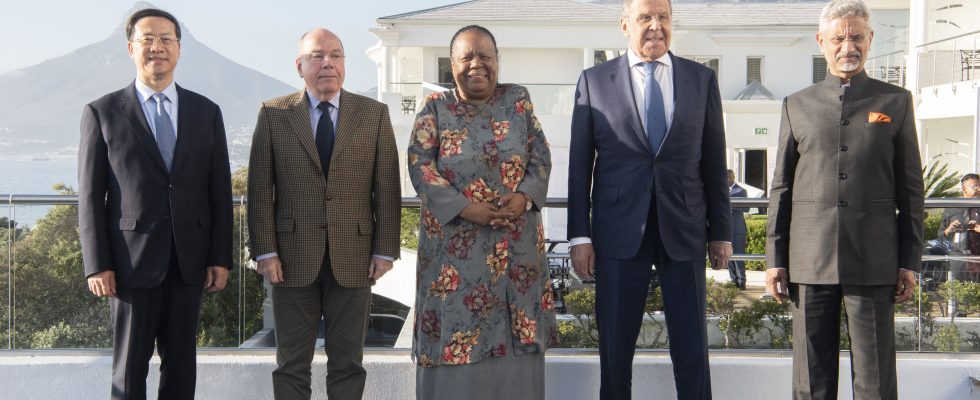It is in a large conference center in Sandton, in the suburbs of Johannesburg, that the the 15ᵉ Brics summit (Brazil, Russia, India, China and South Africa) from August 22 to 24. If Lula, Xi Jinping and Narendra Modi will be present around the South African President, Cyril Ramaphosa, a key figure will be missing: Vladimir Poutine. The International Criminal Court has issued an arrest warrant for the Russian president, which would have forced South Africa to arrest him as soon as he arrived on the territory. He will be represented by Sergei Lavrov, his foreign minister.
But Putin’s absence will not prevent the BRICS from debating a hot topic: expanding the group to new countries. Leaders from 67 countries in Africa and the Global South have been invited to attend the opening and select events.
42% of the world’s population
Currently chaired by South Africa, the “club” of the BRICS brings together 42% of the world’s population (3.2 billion people) and around 25% of the world’s GDP. But, with 23 officially candidate countries to integrate the organization, this geopolitical space could, in time, constitute more than half of the world’s population.
Among them are mainly African countries, such as Ethiopia, Senegal, Algeria and Egypt, seduced by the political and economic “non-alignment” of the BRICS. The theme of the 2023 summit is “BRICS and Africa: partnership for mutually accelerated growth, sustainable development and inclusive multilateralism“Other African states have shown interest in joining the organization, without however submitting an official application, such as Gabon, the Comoros or the Democratic Republic of Congo.
Admission criteria to be defined
Gulf oil countries, such as the United Arab Emirates and Saudi Arabia, or even Iran are candidates. Hossein Amir Abdollahian, the head of Iranian diplomacy, traveled in person to Pretoria in early August to seek support. A dozen other countries are candidates, particularly in Latin America and Asia. For the moment, the members of the BRICS and their respective foreign ministers have begun to discuss the admission criteria. Discussions will continue during the Johannesburg summit.
This is not the first time that the Brics have considered expanding. South Africa joined the group in 2010, a year after the first summit, in Yekaterinburg, Russia. It was also Pretoria which had proposed to integrate new members in 2018, but Beijing and Moscow had opposed this approach. We have to wait for the Brics summit in 2022 for the process of integrating new members to really begin.
Diverging interests
Even today, the five BRICS countries do not quite agree on the issue and their interests diverge. India and Brazil are the most reluctant, while China and Russia are pushing for this extension to increase their influence, especially Moscow, isolated by the West since the start of the war in Ukraine.
But other important issues are on the agenda such as the acceleration of “dedollarization”. The Brics want to reduce their dependence on the US dollar. A question that could also influence the choice of whether or not to integrate new members into the group.
